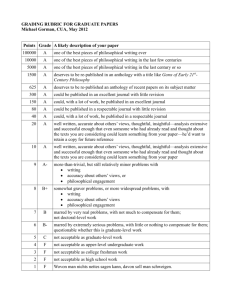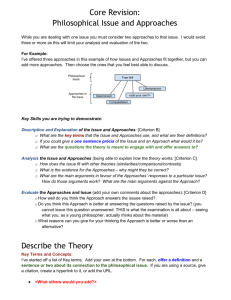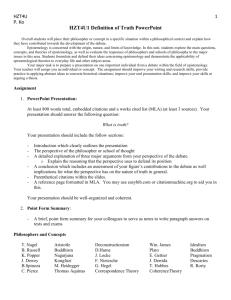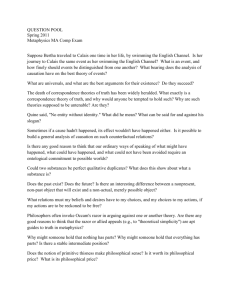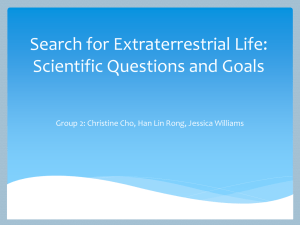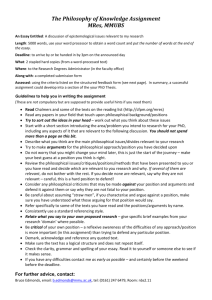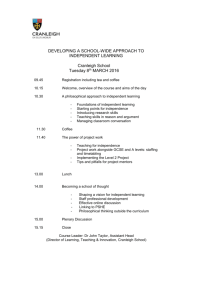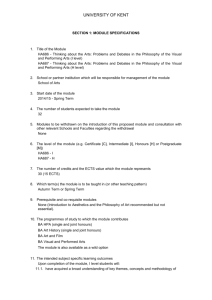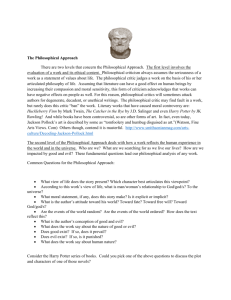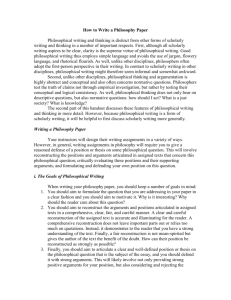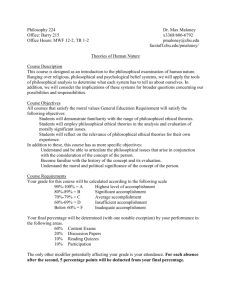UNIVERSITY OF KENT MODULE SPECIFICATION TEMPLATE
advertisement
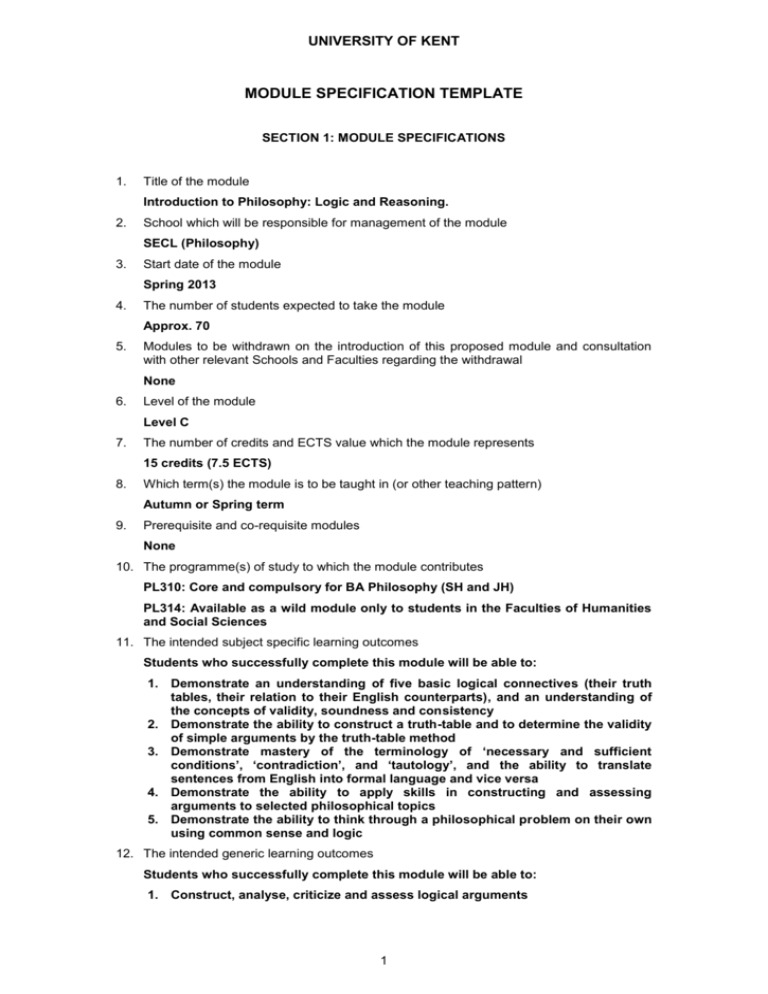
UNIVERSITY OF KENT MODULE SPECIFICATION TEMPLATE SECTION 1: MODULE SPECIFICATIONS 1. Title of the module Introduction to Philosophy: Logic and Reasoning. 2. School which will be responsible for management of the module SECL (Philosophy) 3. Start date of the module Spring 2013 4. The number of students expected to take the module Approx. 70 5. Modules to be withdrawn on the introduction of this proposed module and consultation with other relevant Schools and Faculties regarding the withdrawal None 6. Level of the module Level C 7. The number of credits and ECTS value which the module represents 15 credits (7.5 ECTS) 8. Which term(s) the module is to be taught in (or other teaching pattern) Autumn or Spring term 9. Prerequisite and co-requisite modules None 10. The programme(s) of study to which the module contributes PL310: Core and compulsory for BA Philosophy (SH and JH) PL314: Available as a wild module only to students in the Faculties of Humanities and Social Sciences 11. The intended subject specific learning outcomes Students who successfully complete this module will be able to: 1. Demonstrate an understanding of five basic logical connectives (their truth tables, their relation to their English counterparts), and an understanding of the concepts of validity, soundness and consistency 2. Demonstrate the ability to construct a truth-table and to determine the validity of simple arguments by the truth-table method 3. Demonstrate mastery of the terminology of ‘necessary and sufficient conditions’, ‘contradiction’, and ‘tautology’, and the ability to translate sentences from English into formal language and vice versa 4. Demonstrate the ability to apply skills in constructing and assessing arguments to selected philosophical topics 5. Demonstrate the ability to think through a philosophical problem on their own using common sense and logic 12. The intended generic learning outcomes Students who successfully complete this module will be able to: 1. Construct, analyse, criticize and assess logical arguments 1 UNIVERSITY OF KENT 2. Demonstrate the ability to work in groups, and communicate their ideas to other group members 3. Demonstrate their ability to work autonomously and to take responsibility for their learning 13. A synopsis of the curriculum Since Plato’s Dialogues, it has been part of philosophical enquiry to consider philosophical questions using logic and common sense alone. This module aims to train students to continue in that tradition. In the first part students will be introduced to basic themes in introductory logic and critical thinking. In the second part students will be presented with a problem each week in the form of a short argument, question, or philosophical puzzle and will be asked to think about it without consulting the literature. The problem, and students’ responses to it, will then form the basis of a structured discussion. By the end of the module, students (a) will have acquired a basic logical vocabulary and techniques for the evaluation of arguments; (b) will have practised applying these techniques to selected philosophical topics; and (c) will have acquired the ability to look at new claims or problems and to apply their newly acquired argumentative and critical skills in order to generate philosophical discussions of them. 14. Indicative Reading List Copi & Cohen, Introduction to Logic and Elogic Exercises, Prentice Hall 2004 Fisher, A., The Logic of Real Arguments, CUP, 2004 Baggini, J. & Fosl, P.S., The Philosopher’s Toolkit: A Compendium of Philosophical Concepts and Methods, Blackwell, 2003 Hodges, W., Logic, 2nd ed., Penguin, 2001 Howson, C., Logic with Trees, Taylor & Francis Ltd, 1997 15. Learning and Teaching Methods, including the nature and number of contact hours and the total study hours which will be expected of students, and how these relate to achievement of the intended learning outcomes In the first half of the module (five weeks), students will be taught by one 1-hour lecture and one 1-hour seminar per week. Lectures will cover the common body of knowledge/topics and set of skills with which all students will be required to be familiar. Seminars will provide a forum for embedding and discussing the lecture material (SSLOs (1)-(3) and GLOs (1) and (2)) In the second half of the module (six weeks), students will be taught by one 2-hour seminar per week, which will provide them with an opportunity to use the skills acquired in the first part of the course to identify, analyse and evaluate real arguments (SSLOs (4) and (5) and GLOS (1) and (2)) Students should also engage in approximately 10 hours per week of independent study, to include consolidation of material previously covered, and preparation for in-class assessments (GLO (3)) Total contact hours = 22; Total study hours = 150 16. Assessment methods and how these relate to testing achievement of the intended learning outcomes Assessment is 100% coursework, comprising: In-class assessment 1 – 45% (90 minutes in length written assignment) In-class assessment 2 – 45% (90 minutes in length written assignment) Seminar participation – 10% In-class assessments will test SSLOs (1)-(6) and GLO (1). Seminar participation will test SSLO (4) and GLOs (1-3). 17. Implications for learning resources, including staff, library, IT and space None 2 UNIVERSITY OF KENT 18. The School recognises and has embedded the expectations of current disability equality legislation, and supports students with a declared disability or special educational need in its teaching. Within this module we will make reasonable adjustments wherever necessary, including additional or substitute materials, teaching modes or assessment methods for students who have declared and discussed their learning support needs. Arrangements for students with declared disabilities will be made on an individual basis, in consultation with the University’s disability/dyslexia support service, and specialist support will be provided where needed. 19. Campus(es) where module will be delivered 1 Canterbury If the module is part of a programme in a Partner College or Validated Institution, please complete the following: 20. Partner College/Validated Institution N/A 21. University School (for cognate programmes) or Faculty (for non-cognate programmes) responsible for the programme N/A SECTION 2: MODULE IS PART OF A PROGRAMME OF STUDY IN A UNIVERSITY SCHOOL Statement by the School Director of Learning and Teaching/School Director of Graduate Studies (as appropriate): "I confirm I have been consulted on the above module proposal and have given advice on the correct procedures and required content of module proposals" ................................................................ .............................................. Director of Learning and Teaching/Director of Graduate Studies (delete as applicable) Date ………………………………………………… Print Name Statement by the Head of School: "I confirm that the School has approved the introduction of the module and, where the module is proposed by School staff, will be responsible for its resourcing" ................................................................. .............................................. Head of School Date ……………………………………………………. 1 Required for information purposes only. Changes of campus will not require re-approval of the module specification. 3 UNIVERSITY OF KENT Print Name 4
